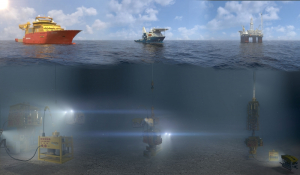Stabilizing oil prices have prompted producers to return to both shale and offshore projects, but the industry still needs to cut costs.
A new workforce program offered by the University of Houston Cullen College of engineering focuses on helping oil and gas producers more efficiently use and maintain equipment by making better use of the terabytes of data streaming from monitoring sensors built into equipment. It will launch in fall 2017.
“Companies lose billions of dollars because equipment went down unexpectedly,” said Matthew Franchek, founding director of the UH graduate subsea engineering program, the first in the nation. “The industry needs a 21st century oil and gas workforce.”
The graduate certificate program, Data Analytics for Condition and Performance Monitoring of Engineered Systems, is open to people with an undergraduate degree in any engineering discipline. The curriculum includes three courses for nine credit hours. The program is available both on campus and online.
Designed to teach engineers to use mathematical modeling, simulation and data processing in real-world situations, the system can dramatically reduce the amount of data companies are required to store and allows them to shift from scheduled maintenance shutdowns to performing maintenance only when needed. That saves money by avoiding unnecessary shutdowns and also reduces data storage costs, Franchek said.
The system operates on the same principal as that used by your car to estimate how much farther you can drive without running out of gas, an estimate that is constantly adjusted based on your driving patterns.
Offered through the subsea engineering program, the certificate will train workers from across the industry, not only those working in deep water.
Ultimately, it could be used in the medical, aerospace and other industries.
Franchek said the process was developed by key players in the energy industry and rigorously tested over the past year. UH created the curriculum to allow for wider adoption.
He said the three-course program is the first to fully employ the Industrial Internet of Things – the idea that “smart” machines using Big Data technology and machine learning are better than humans at accurately and consistently capturing data – as well as the first graduate engineering curriculum dealing with real-time condition and performance monitoring of oil and gas production systems.
Almost all oilfield equipment now is fitted with sensors that provide data about operations. But Franchek said the traditional method of interpreting the data takes months and requires that it be stored for extended periods of time.
Companies continue to reassess expenses in order to continue operations while satisfying shareholders, Franchek said. “Why shut down if they don’t need to? Or why have an unexpected shutdown?”
But the system also is expected to reduce risks to both workers and the environment as companies gain advance warning before potentially disastrous accidents.
“With this system, the equipment will call you when it needs an update or maintenance,” Franchek said.
Additional information on the graduate certificate program in Data Analytics for Condition and Performance Monitoring of Engineered Systems will be available soon at subsea.egr.uh.edu/certificate-program/certificate-subsea-engineering
